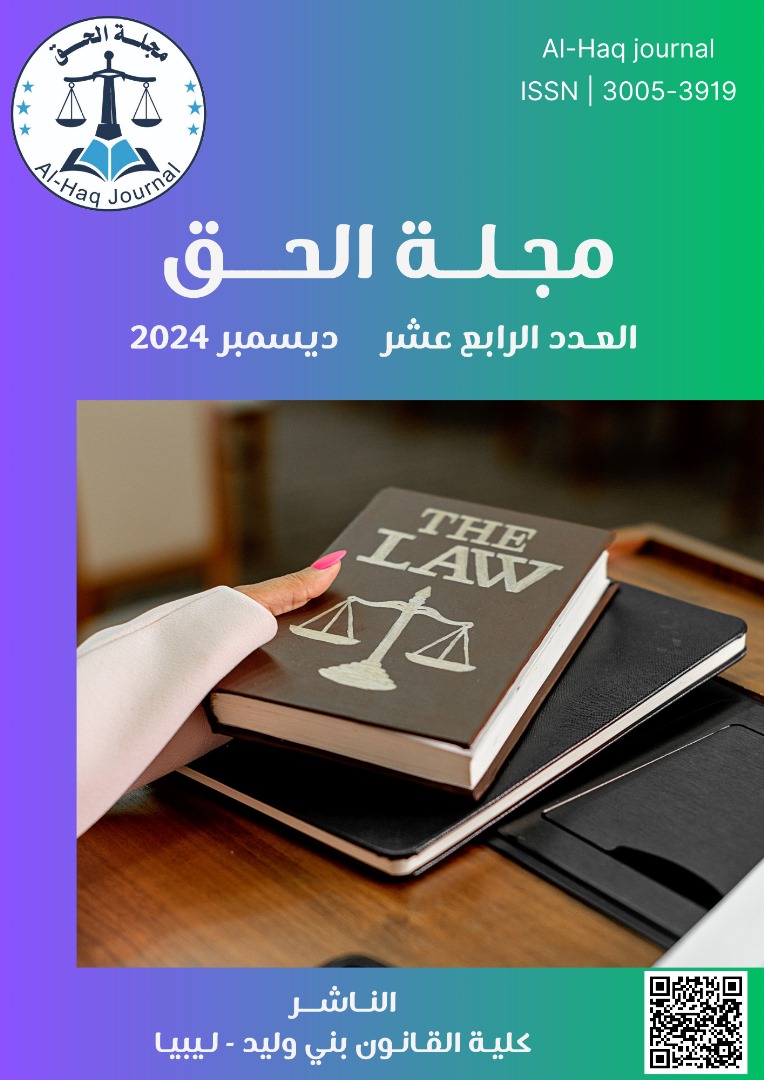The role of artificial intelligence in achieving sustainable development
DOI:
https://doi.org/10.58916/alhaq.vi.239Keywords:
Organizational intelligence, sustainable development, practical applications, technology, environmentAbstract
The study explores the potential of AI in advancing sustainable development by improving innovation, streamlining decision-making, and increasing productivity. It focuses on addressing social, economic, and environmental issues using AI technologies like machine learning and big data analytics. AI can improve economic efficiency by boosting productivity, reducing resource waste, and streamlining supply chains. It can also provide access to essential services like healthcare and education, and deliver customized solutions that meet local communities' needs, promoting social justice. The study discusses the origins and evolution of AI, as well as its real-world applications in sustainable agriculture, water management, and energy. It highlights challenges like privacy and ethical issues and emphasizes the need for integrated solutions to achieve the Sustainable Development Goals. The project aims to investigate how AI can support sustainable development by improving manufacturing, reducing environmental impact, and enhancing natural resource efficiency. It also seeks to improve collaboration between different stakeholders, such as governments, businesses, and civil society.
Downloads
References
References
First: Books
Abu Al-Nasr, Medhat Muhammad, (2018), Sustainable Development: Its Concept - Dimensions - Indicators, Cairo, Arab Group for Training and Publishing.
Second: Scientific Journals
Abu Zaid, Ahmed Al-Shura, (2022). Artificial Intelligence and the Quality of Governance, Journal of the Faculty of Economics and Political Science, 23(4).
Ahmed, Ibrahim Abdel Nabi, (2024), The Importance of Artificial Intelligence in Human Resources Management and Social Development: An Applied Study: Ministry of Human Resources and Social Development, International Journal of Development, 13(2).
Al-Sayed Fares, Muhammad, (2024). Towards a New Concept of Artificial Intelligence and an Attempt to Regulate It Legally, a Comparative Study. Journal of Sharia and Law in Cairo, Issue (43).
Al-Barashi, Tariq Al-Sayed, (2024), The Role of Artificial Intelligence in Achieving Sustainable Development in Egypt, Raya International Journal of Commercial Sciences, Vol. (3), No. (9).
Dr. Al-Haqqan, Nada Muhammad, (2023). Artificial Intelligence and its Effectiveness in Developing Interior Design Skills. Journal of Arts, Literature, Humanities and Social Sciences, (88).
Al-Anzi, Thamer Attia, (2022), Artificial Intelligence as an Approach to Achieving Sustainable Development in the Business Environment According to the Pillars of the Kingdom's Vision 2030, Journal of Economic, Administrative and Legal Sciences, Vol. (6), No. (13).
Arab Democratic Center, (2023), The Role of Artificial Intelligence in Military Applications, Journal of Strategic and Military Studies, No. (19).
Ayed Ali Al-Qahtani, (2022), The Role of Artificial Intelligence in Achieving Sustainable Development within the Framework of the Kingdom of Saudi Arabia's Vision 2030, Arab Journal of Informatics and Information Security, Vol. (3), No. (9).
Abdul-Ghani, Muhammad Fathi, (2020), The Development of the Concept of Sustainable Development, Its Dimensions and Results, Scientific Journal of Economics and Trade.
Abdul-Shahid, (2019), The Internet of Smart Things in the Field of Healthcare (The Internet of Things for Smart Healthcare). Journal of the Academy, Misurata, Libya.
Abdul Salam Ali Ahmed, (2023). A study on the use of artificial intelligence in education in Arab countries. Libyan Journal of Contemporary Academic Studies.
Abdel Moneim, Muhammad Ismail, Hiba, (2021), A research project on the economic implications of the Fourth Industrial Revolution "Artificial Intelligence", Arab Monetary Fund.
Ali bin Muhammad, Al-Muni, (2024). Using artificial intelligence algorithms in analyzing big data for tweets celebrating the founding day of the Saudi state, No. (38).
Kamel, Ahmed Muhammad, (2023), The role of artificial intelligence in confronting the economic burden of the food problem in Egypt, the challenges and legal and economic prospects of artificial intelligence.
Kamal, Muhammad, (2024). Artificial intelligence in Egypt between the performance of workers appointed by traditional methods and the use of modern technology. Journal of Financial and Commercial Research, 25(2).
Hanaa Rizk Mohamed, (2021), Artificial Intelligence Systems and the Future of Education, Journal of Studies in University Education, No. (52).
Harmouzi, Bouzid Mohamed, (2024). Artificial Intelligence Strategies in Achieving Sustainable Development, the Experience of the United Arab Emirates, Vol. 2, No. (1).
Yassin, Ben Nafla, (2024). The Future of Healthcare Services in the Age of Artificial Intelligence. Annales de l’université d’Alger, 38(3).
Youssef Abdel Fattah, Narmin, (2024), The Impact of Using Artificial Intelligence in Big Data Analysis on Internal Audit, Scientific Journal of Financial and Commercial Studies and Research, 5(2).
Fourth: References in English
Buseisi, Salah Jabeer, and Hazem Fares Habib. "Response of the Four Geneva Conventions of 1949 to the Use of Artificial Intelligence Weapons Systems in Armed Conflict." Risalat al-Huquq Journal, vol. 15, no. 5, 2023, pp. 11-27.
Kerasidou, A. (2020). Artificial intelligence and the ongoing need for empathy, compassion and trust in healthcare. Bulletin of the World Health Organization, (4).
Downloads
Published
Issue
Section
License

This work is licensed under a Creative Commons Attribution-NonCommercial 4.0 International License.









